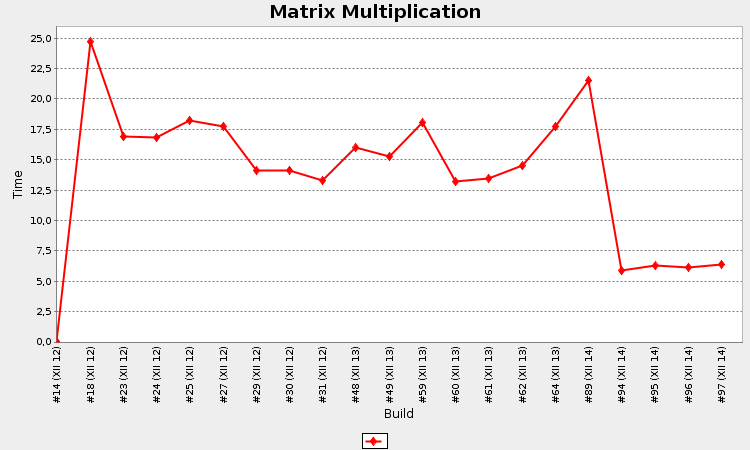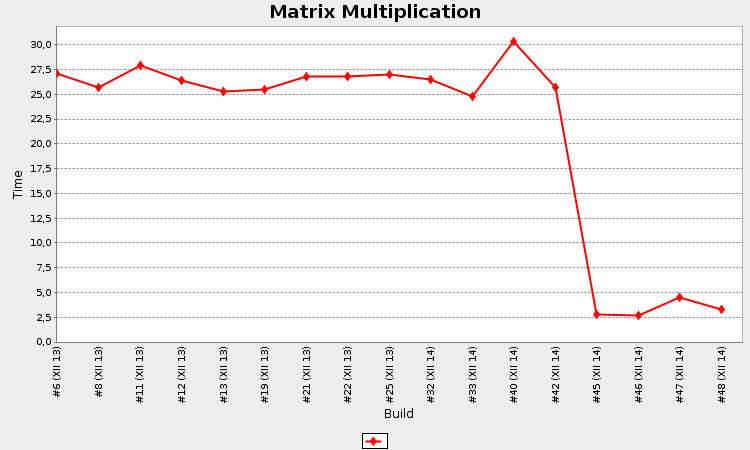Bck2BrwsrViaRegisters
From APIDesign
| Line 15: | Line 15: | ||
On Dec 14, 2012 Ľubomír made a significant break through: after rewrite to register based system (thanks to analysis of stackmap information), our matrix benchmark got at least twice as fast on [[Firefox]]: | On Dec 14, 2012 Ľubomír made a significant break through: after rewrite to register based system (thanks to analysis of stackmap information), our matrix benchmark got at least twice as fast on [[Firefox]]: | ||
| - | + | [[Image:Bck2BrwsrRegistersFirefox.png]] | |
and about 10x(!) faster on [[Chrome]]: | and about 10x(!) faster on [[Chrome]]: | ||
| + | |||
| + | [[Image:Bck2BrwsrRegistersChrome.png]] | ||
| + | |||
| + | Congratulation Ľubomír! Of course the magic in in eliminating the stack and using normal local variables. At the end the code looks like: | ||
| + | |||
| + | <source lang="javascript"> | ||
| + | function plus(arg1, arg2) { | ||
| + | var i1, i2; | ||
| + | i1 = arg1; | ||
| + | i2 = arg2; | ||
| + | return i1 + i2; | ||
| + | } | ||
| + | </source> | ||
| + | |||
| + | Which is good enough for [[Chrome]]'s [[JavaScript]] virtual machine to swallow (and hence the ten times boost). [[Firefox]] probably does not optimize the unnecessary assignments well enough and thus the speed up was less dramatic. | ||
| + | |||
| + | PS: A thing to note is that originally (with the stack based approach) the [[Firefox]] was faster than [[Chrome]]. Looks like [[Chrome]] guys forgot to optimize for '''Array.push''' and '''Array.pop'''! | ||
Revision as of 12:10, 14 December 2012
Original implementation of Bck2Brwsr virtual machine used Java classical stack based operations. E.g. when one needed to sum two numbers we had to manipulate the stack:
function plus(arg1, arg2) { var stack = new Array(); stack.push(arg1); stack.push(arg2); stack.push(stack.pop() + stack.pop()); return stack.pop(); }
This is almost one to one translation of Java's bytecode, but obviously, this is not really fast. Instead of a single operation, we are asking the JavaScript engines to manipulate with stack six times!
On Dec 14, 2012 Ľubomír made a significant break through: after rewrite to register based system (thanks to analysis of stackmap information), our matrix benchmark got at least twice as fast on Firefox:
and about 10x(!) faster on Chrome:
Congratulation Ľubomír! Of course the magic in in eliminating the stack and using normal local variables. At the end the code looks like:
function plus(arg1, arg2) { var i1, i2; i1 = arg1; i2 = arg2; return i1 + i2; }
Which is good enough for Chrome's JavaScript virtual machine to swallow (and hence the ten times boost). Firefox probably does not optimize the unnecessary assignments well enough and thus the speed up was less dramatic.
PS: A thing to note is that originally (with the stack based approach) the Firefox was faster than Chrome. Looks like Chrome guys forgot to optimize for Array.push and Array.pop!



